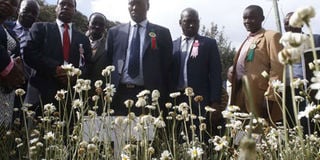Funds hitch delays formation of association in pyrethrum counties

Nakuru County Governor Lee Kinyanjui (C), Deputy Governor Erick Korir (R) and other officials during at tour of the Pyrethrum Processing Company stand at the Agricultural Society of Kenya showground on July 5, 2018. PHOTO | AYUB MUIYURO | NATION MEDIA GROUP
What you need to know:
- Reluctance by some counties, to commit funds for the revival of the once lucrative sector, and unstable funding from the national government are to blame.
This is the second attempt by governors in pyrethrum growing regions to revive the struggling sector.
Lack of payments for deliveries, coupled with cartels and mismanagement of the sub-sector, have been blamed for the collapse of the once lucrative sector.
Lack of funding is threatening to derail plans by 19 pyrethrum-growing counties to form an association that would lobby for their common interests.
The Nation has established that reluctance by some counties, to commit funds for the revival of the once lucrative sector, and unstable funding from the national government are to blame for the delayed formation of the alliance.
TOP OFFICIALS
It emerged that despite top officials from the counties holding a number of meetings, little has been achieved in the formation of the bloc.
The pyrethrum-growing counties that are seeking to form the bloc are Nakuru, Nyandarua, Nyeri, Kiambu, Trans Nzoia, Uasin Gishu, Elgeyo Marakwet, Kisii and West Pokot.
Others are Nandi, Baringo, Laikipia, Narok, Kericho, Bomet , Kisii, Nyamira, Bungoma, Muranga, Kirinyaga and Meru.
According to the Kisii County Executive Committee (CEC) Member in charge of Agriculture, Livestock, Fisheries and Cooperative Development, Esman Onsarigo, a number of counties have not committed budgets to support the revival.
“Several counties have not set aside funds to, for instance, provide farmers with seedlings. We are also facing a raft of challenges, which include unsettled debts the Pyrethrum Processing Company owes farmers, “said Mr Onsarigo.
MEETINGS
The CEC, who has been part of the efforts to revive the crop, revealed that top officials from the pyrethrum growing counties have held various meetings and identified challenges facing the sector, but funding remained a challenge
“I urge the national government to pump more money to counties to boost the revival. Counties need money for nurseries and other things,” said Mr Onsarigo.
His counterpart from Nyandarua County, Dr James Karitu, said not much has happened in the national government initiative to revive pyrethrum.
“We only got as far as forming a technical committee. Little else has happened so far. But as a county, we have set aside some funds for the same, but we hope to be more vibrant in the 2019/20 fiscal year,” said Dr Karitu.
Currently, the department is sourcing for seeds for a few farmers for trials and to motivate more growers.
NATIONAL GOVERNMENT
“Besides the expected national government interventions, we are also discussing with other stakeholders to assist us in reviving the sector.
"Pyrethrum is now a liberalised crop. We are having discussions with some partners who will support the farmers through provision of inputs and also sign market agreements with our growers,” said Dr Karitu.
Top officials from other counties, who were interviewed but sought anonymity, said unstable funding had derailed the plans.
Nakuru County, under Governor Lee Kinyanjui, set aside Sh20 million for pyrethrum revival through the Agriculture department.
A roadmap for reviving the crop was set out in Governor Kinyanjui’s manifesto. Mr Kinyanjui says the revival has already taken root, farmers having harvested their crop this year.
This is the second attempt by governors in pyrethrum growing regions to revive the struggling sector.
SIMILAR TALKS
Last year, 18 governors held similar talks with the support of the Ministry of Agriculture, but little came out of it.
Lack of payments for deliveries, coupled with cartels and mismanagement of the sub-sector, have been blamed for the collapse of the once lucrative sub-sector.
Apart from delays in payment, PBK was unable to supply farmers with critical farm inputs particularly seedlings.
The struggling Pyrethrum Processing Company of Kenya (PPCK) factory in Nakuru is struggling to pay debts owed to contractors, farmers and other organisations amounting to millions of shillings.
The factory, which is the biggest in Africa, has the capacity to crush 25 tonnes per day and also boasts of a 600-tonne holding tank.
HEY DAYS
During its hey days, it was a beehive of activity with the machines running daily. Today, it is a pale shadow of former self and a relic.
According to statistics from the former Pyrethrum Board of Kenya (PBK) the number of farmers who grew pyrethrum has sharply dropped from about 300,000 in the 1980s to around 5,000 currently.
A survey conducted by the Nation in 2016 revealed that most farmers have now shifted focus to dairy and horticultural farming, and other small scale businesses, which they consider more profitable.





